40 monty hall tree diagram
Hierarchy of hazard control is a system used in industry to minimize or eliminate exposure to hazards. It is a widely accepted system promoted by numerous safety organizations. Monty Hall dilemma Monty Hall explained Chance Tree for Monty Hall Dilemma Consider a compound experiment consists of (a) \placing" the car randomly in three doors, (b) host opening a door according to the rules. Clearly the latter two branches correspond to the situation in which the contestant nding the prize if he switches. Hence the ...
In the above diagram, the data moves in the forward direction with 3 nodes in Layer 1 having a distinct function to process within itself. These have found useful usage in face recognition modeling and computer vision. 2. Radial Basis Function (RBF) Neural Network
Monty hall tree diagram
The Monty Hall problem is based on apparent paradox that is commonly misun-derstood, even by mathematicians. In this paper we define the Monty Hall problem and use a computer simulation to shed light on it. We then provide a mathematical explanation that fits the experimental results. 1. The Monty Hall problem ... Conditional probability tree diagram example (Opens a modal) Tree diagrams and conditional probability Figure 17.1 The tree diagram for computing the probability that the local team wins two out of three games given that they won the first game. Step 1: Find the Sample Space Each internal vertex in the tree diagram has two children, one corresponding to a win for the local team (labeled W) and one corresponding to a loss (labeled L).
Monty hall tree diagram. a tree diagram or an area model here, but you may need to draw separate diagrams for ... known as "The Monty Hall Problem," named for the game show host of Let's Make a Deal. You will have 3 tasks. Task 1: Find the experimental probability of winning when you stick with the first Checkout DROPOUT: https://signup.dropout.tv It's our new ad-free, uncensored, subscription video service! The cast you love in brand new, exclusive series! Original and funny videos from ... Monty Hall Problem is one of the most perplexing mathematics puzzle problems based on probability. It was introduced by Marilyn Savant in 1990. It is named after the host of a famous television game show 'Let's Make A Deal'. In this game, the guest has to choose among three closed doors, only one of which has the surprise car behind it ... Monty Hall. Simulation Page . Solution To Monty Hall Problem. ... The probabilities can best be calculated with a tree diagram. Game Rules: 1. Pick a door. The diagram below shows the chances that you will pick the door with the car or either of the goats, Goat A or Goat B. 2. The host then reveals a goat behind one of the remaining doors.
Figure 1 — Tree diagram showing the probabilities associated with the Monty Hall Problem (Diagram by the Author) When you are asked to make your first choice, there is an equal probability that the car is behind any one of the three doors. So you have a 1/3 chance of guessing it correctly. This implies that 2/3 of the times your guesses are ... I read about the Monte Hall problem and understand the principle behind it: The door you choose is random, but the door Monte chooses is NOT. This is why switching doors gives you a higher probability. What I really had a question on is the construction of the decision tree for part (b). (a): I understand this solution is 1/3. (A) Provide a general tree diagram explanation that shows the probability of winning the game if one chooses to adopt the strategy of changing doors after Monty Hall opens a non-winning door. The first three branches of your tree diagram would have probability 1/3, since there are 3 doors and any one of them could contain the winning prize. 1 Monty Hall In the September 9, 1990 issue of Parade magazine, the columnist Marilyn vos Savant ... A tree diagram is a graphical tool that can help us work through the four-step ap-proach when the number of outcomes is not too large or the problem is nicely structured.
The Monty Hall problem is a counter-intuitive statistics puzzle:. There are 3 doors, behind which are two goats and a car. You pick a door (call it door A). You're hoping for the car of course. Monty Hall, the game show host, examines the other doors (B & C) and opens one with a goat. Monty Hall info changes the probabilities as well! Let's see if we can gure out how the probabilities change with the extra information. Build a probability tree. First branch tells if contestant rst picked the right door or rst picked the wrong door. 3 Key insight: if the contestant picks the right door and switches ... Influence Diagrams: The Perfect Decision Tree Complement Submitted by Nicki Franz on Thu, 2014-12-04 09:44 Every DPL model is a combination of an Influence Diagram and a Decision Tree but I admit that we tend to play up the decision tree side of our software, as it is the analytic backbone of the DPL software. The Monty Hall problem is a brain teaser, in the form of a probability puzzle, loosely based on the American television game show Let's Make a Deal and named after its original host, Monty Hall. The problem was originally posed (and solved) in a letter by Steve Selvin to the American Statistician in 1975.
4.1 Tree Diagrams A (probability) tree diagram provides a clear way to map out uncertainties for situations where there is a process that unfolds over several points in time and is surrounded by uncertainties. 4.1.1 The Monty Hall Problem Rarely has a probability problem aroused emotions as much as the Monty Hall problem.
14. Figure 14.2 The full tree diagram for the Monty Hall Problem. The second level indicates the door initially chosen by the player. The third level indicates the door revealed by Monty Hall. 15. "mcs-ftl" — 2010/9/8 — 0:40 — page 395 — #401 16. 14.2. The Four Step Method 17. the host must open door C. However, if the prize is behind door A and the player picks door A, then the ...
The Monty Hall Problem: The statement of this famous problem in Parade Magazine is as follows: Suppose you're on a game show, and you're given the choice of three doors: Behind one door is a car; behind the others, donkey. You pick a door, say No.1, and the host, who knows what's behind the doors, opens another door, say No.3, which has a donkey.
6.C;C;B/ Figure 14.5 The tree diagram for the Monty Hall Problem where edge weights denote the probability of that branch being taken given that we are at the parent of that branch. For example, if the car is behind door A, then there is a 1/3 chance that the player's initial selection is door B. "mcs-ftl" — 2010/9/8 — 0:40 — page ...
Monty Hall Problem: Tree Diagram. ... I am taking the liberty of forwarding the following tree-diagram, which I constructed in December 1990 and is based on the assumptions made by Marilyn vos Savant. Namely: 1. The initial placement of the auto (car) is done at random. 2. The contestant chooses a door at random.
Figure 5: Tree diagram for the Monty Hall Problem. Let C denote the event that the car is behind Door #2; the a priori probability of C is P(C) = 1/3. Let D denote the event that Monty opens Door #3; according to Figure 5 .
UiPath Architecture is an enterprise RPA platform for process automation. The UiPath Architecture is set up by combining its components and database servers along with the communication channels.
The Monty Hall problem is a famous, seemingly paradoxical problem in conditional probability and reasoning using Bayes' theorem. Information affects your decision that at first glance seems as though it shouldn't. In the problem, you are on a game show, being asked to choose between three doors. Behind each door, there is either a car or a goat. You choose a door. The host, Monty Hall ...
The Monty Hall Problem. The Monty Hall Problem gets its name from the TV game show, Let's Make A Deal, hosted by Monty Hall 1. The scenario is such: you are given the opportunity to select one closed door of three, behind one of which there is a prize. The other two doors hide "goats" (or some other such "non-prize"), or nothing at all.
This is the famous Monty Hall problem. By working through Bayes Theorem, we can calculate the actual odds of winning the car if we stick with door A, or switch to door C. Bayes Theorem. Bayes Theorem describes probabilities related to an event, given another event occurs.
car location B C D Figure 16.1 The first level in a tree diagram for the Monty Hall Problem. The branches correspond to the door behind which the car is located. 3. The door that the host opens to reveal a goat. Every possible combination of these randomly-determined quantities is called an outcome.
Monty Hall Problem explained with a tree diagram. Original tree diagram obtained from http://www.cut-the-knot.org/peter.shtmlAs an accompaniment to this vid...
Probability Tree Diagram of Monty Hall Problem As we can see from the diagram, the only place where there is a random event involved is during the initial pick, the elimination process is actually...
MIT 6.042J Mathematics for Computer Science, Spring 2015View the complete course: http://ocw.mit.edu/6-042JS15Instructor: Albert R. MeyerLicense: Creative Co...
3. Monty Hall opens one of the other two doors, revealing a goat behind the door (in this case, door #3) 4. Monty Hall offers the contestant the option to switch to the other remaining door (in this case, to door #2). 5. The contestant makes a final selection of a door (in this case, choosing between door #1 and door #2). 6.
Tree diagrams are a handy tool for solving probability problems. They also illustrate some central concepts of probability. Probabilities are numbers assigned to possibilities. In the Monty Hall problem, there are three possibilities for where the prize is: door A, door B, and door C.
Simple Monty Hall: Choose one of three doors to experimentally determine the odds of winning the grand prize behind one of the doors, as in the TV program "Let's Make a Deal." Parameters: Staying or switching between the two remaining doors.
Figure 17.1 The tree diagram for computing the probability that the local team wins two out of three games given that they won the first game. Step 1: Find the Sample Space Each internal vertex in the tree diagram has two children, one corresponding to a win for the local team (labeled W) and one corresponding to a loss (labeled L).
The Monty Hall problem ... Conditional probability tree diagram example (Opens a modal) Tree diagrams and conditional probability
The Monty Hall problem is based on apparent paradox that is commonly misun-derstood, even by mathematicians. In this paper we define the Monty Hall problem and use a computer simulation to shed light on it. We then provide a mathematical explanation that fits the experimental results. 1.
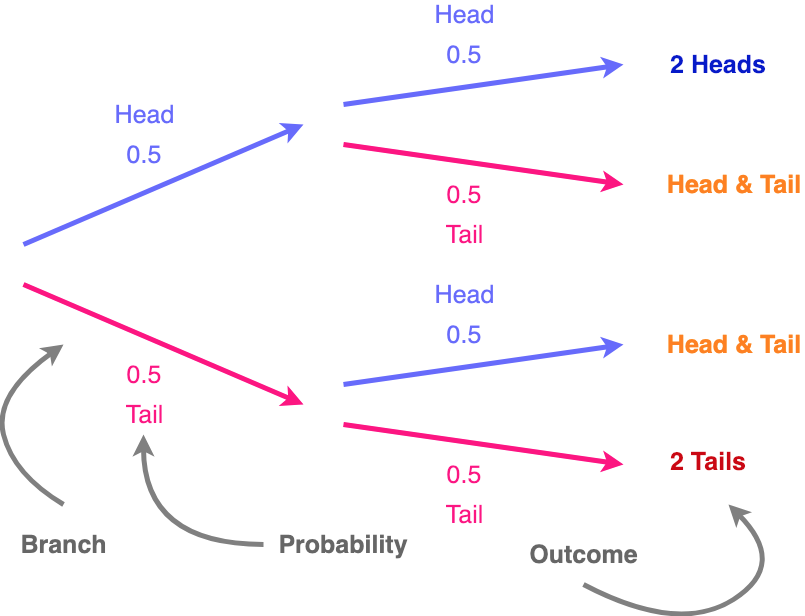
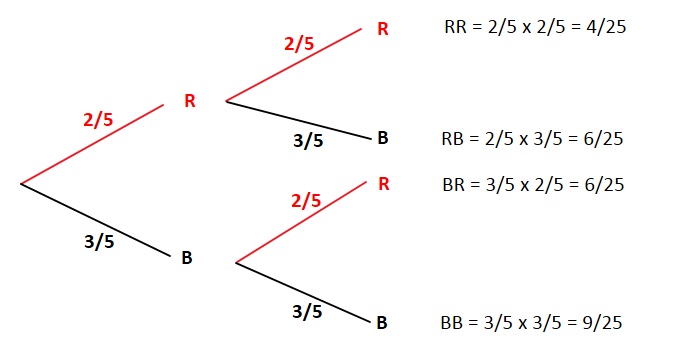
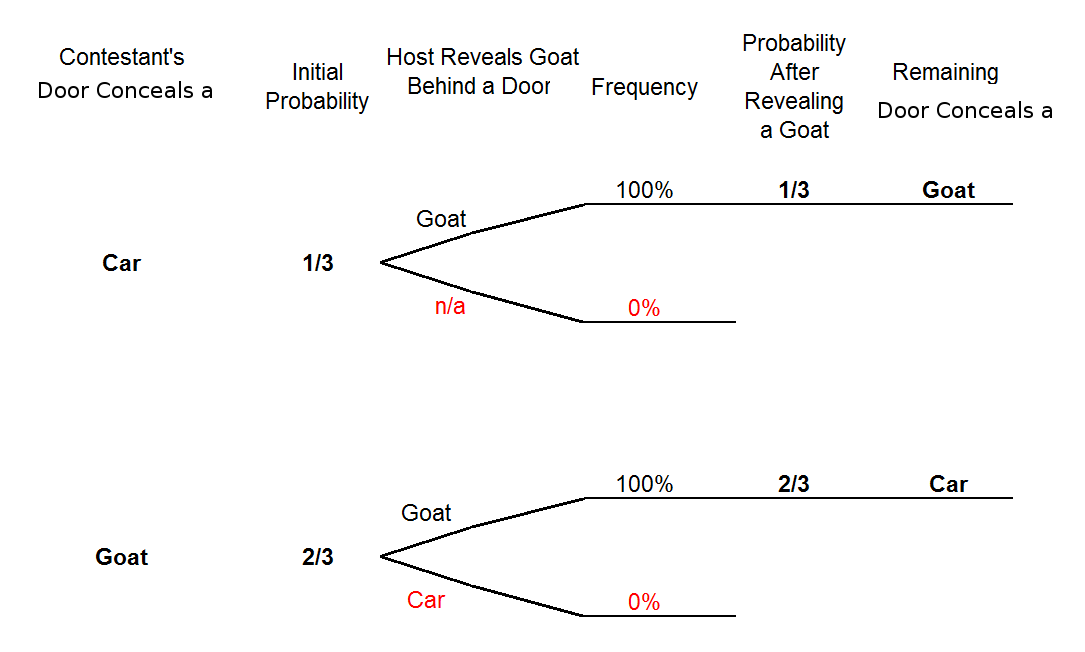






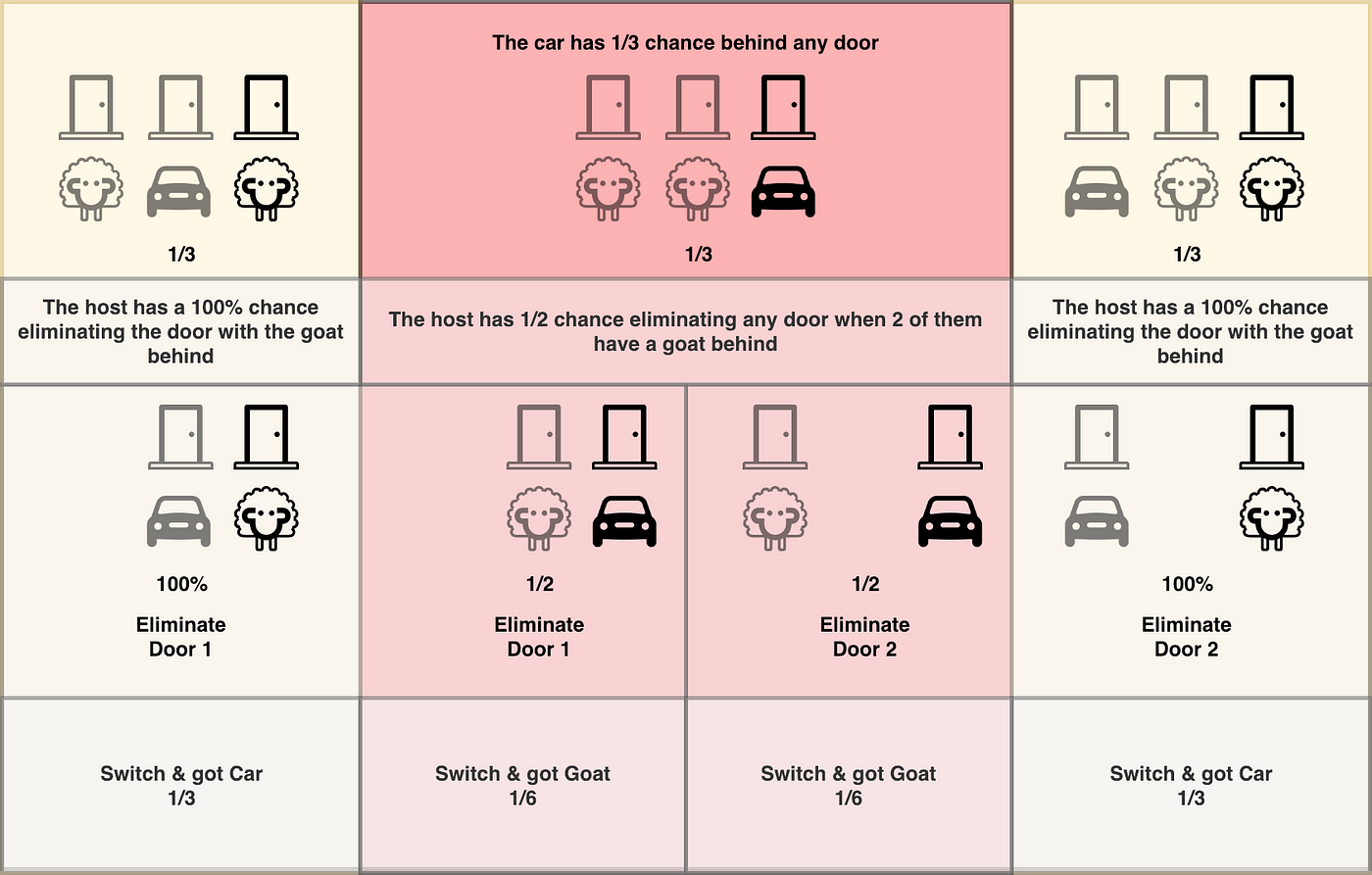

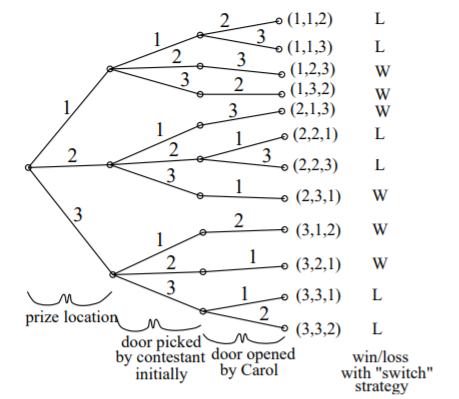
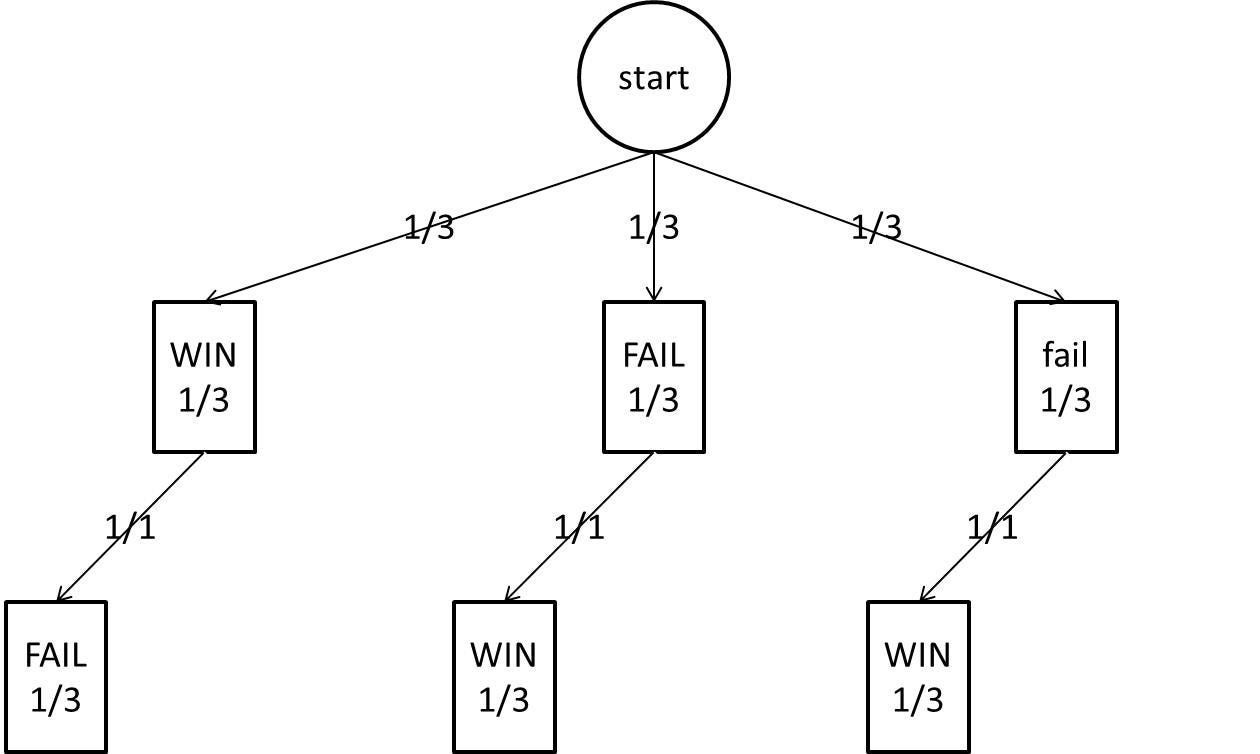

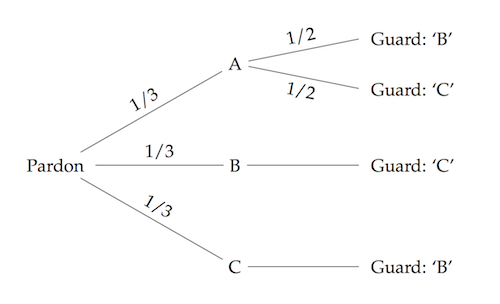

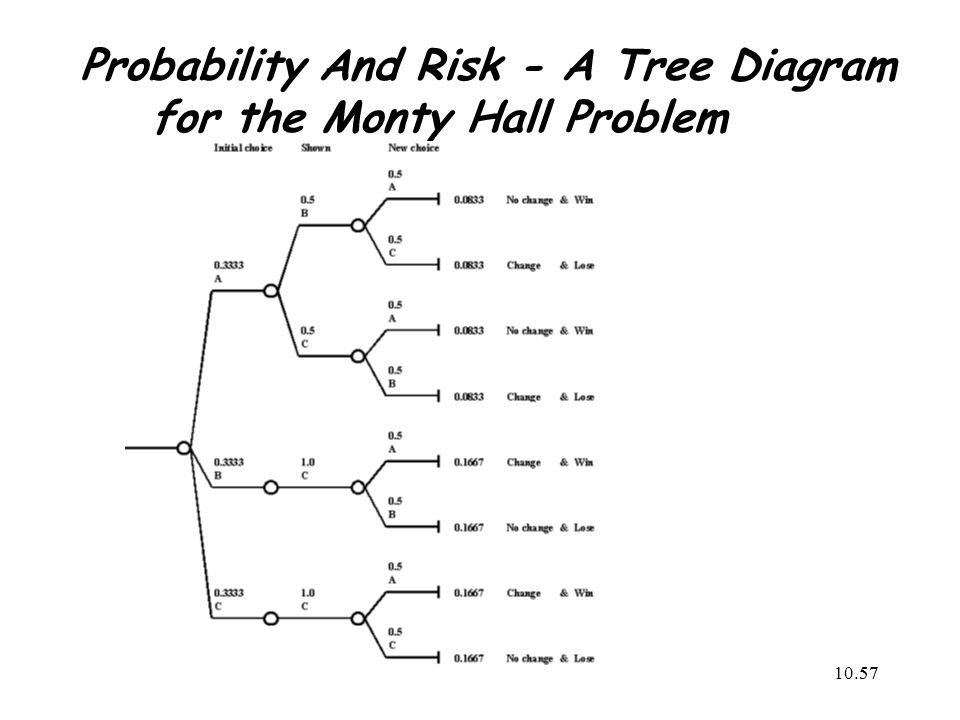
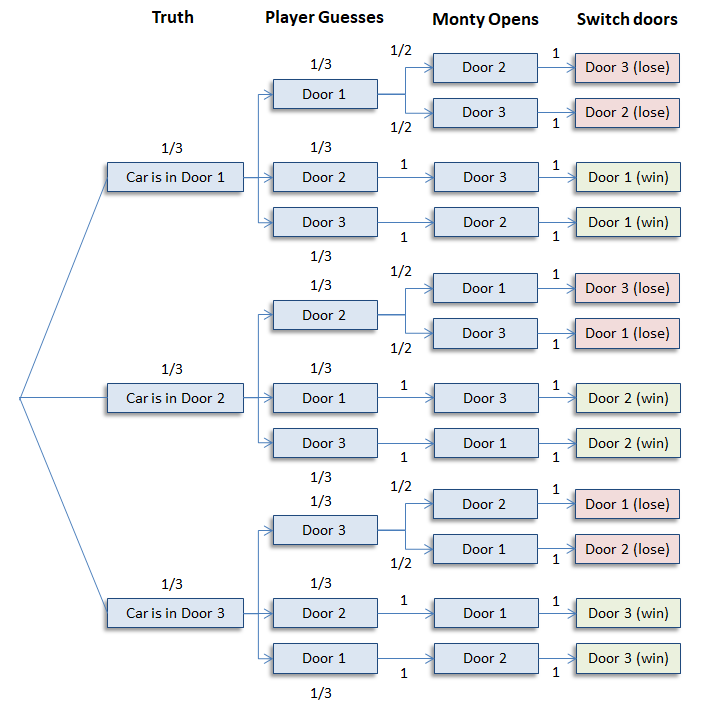


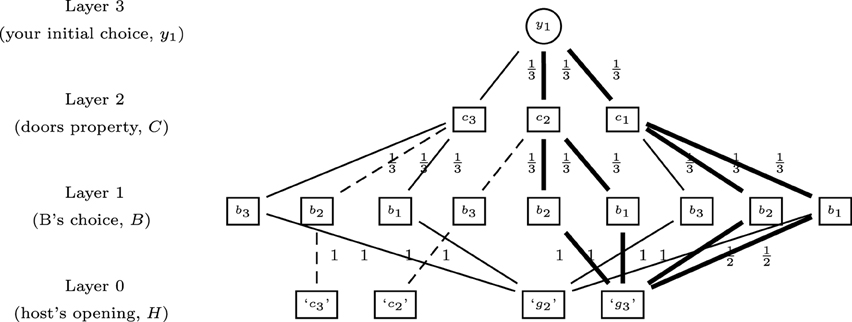



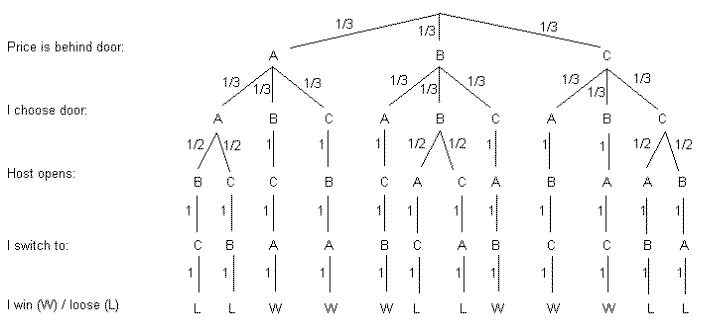


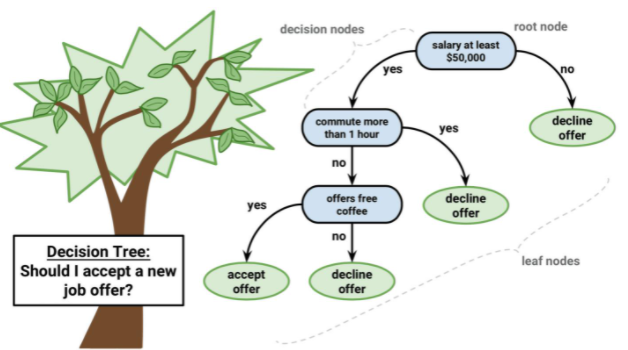
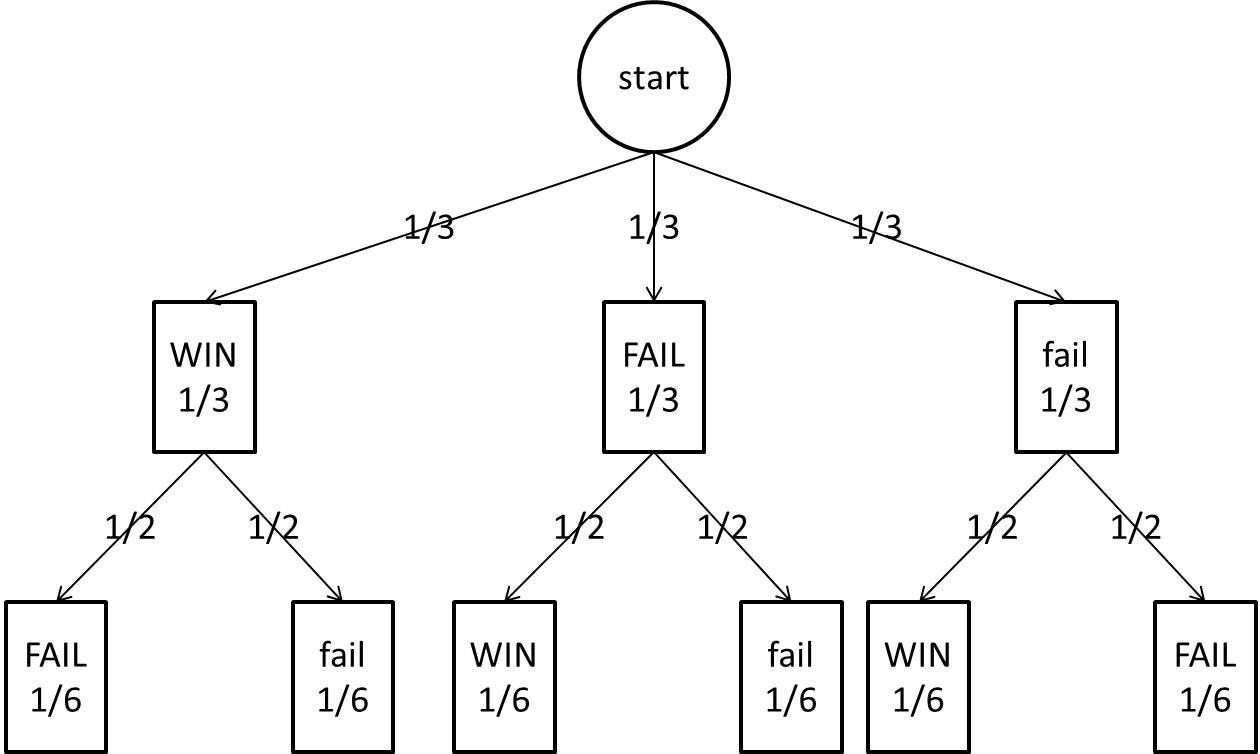
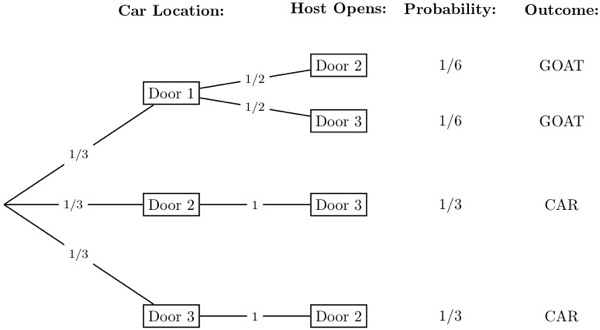
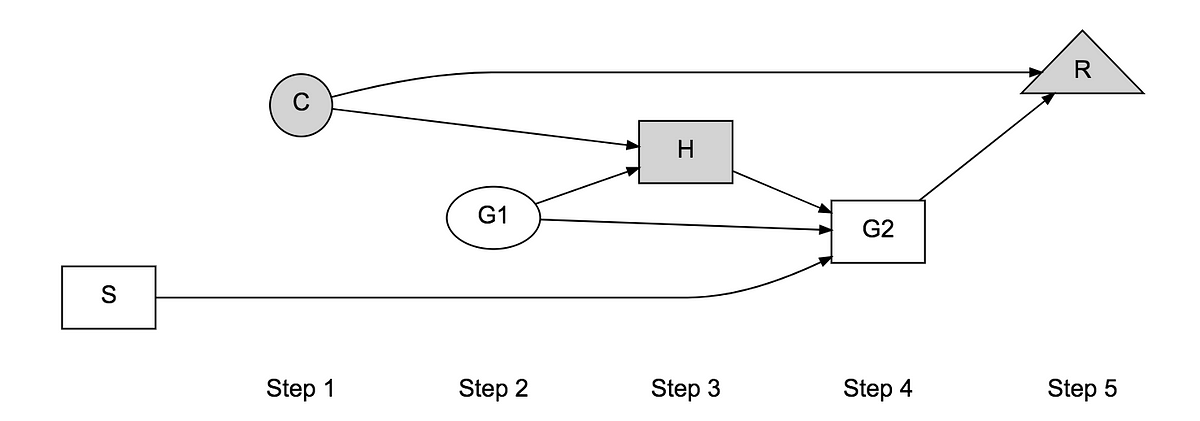
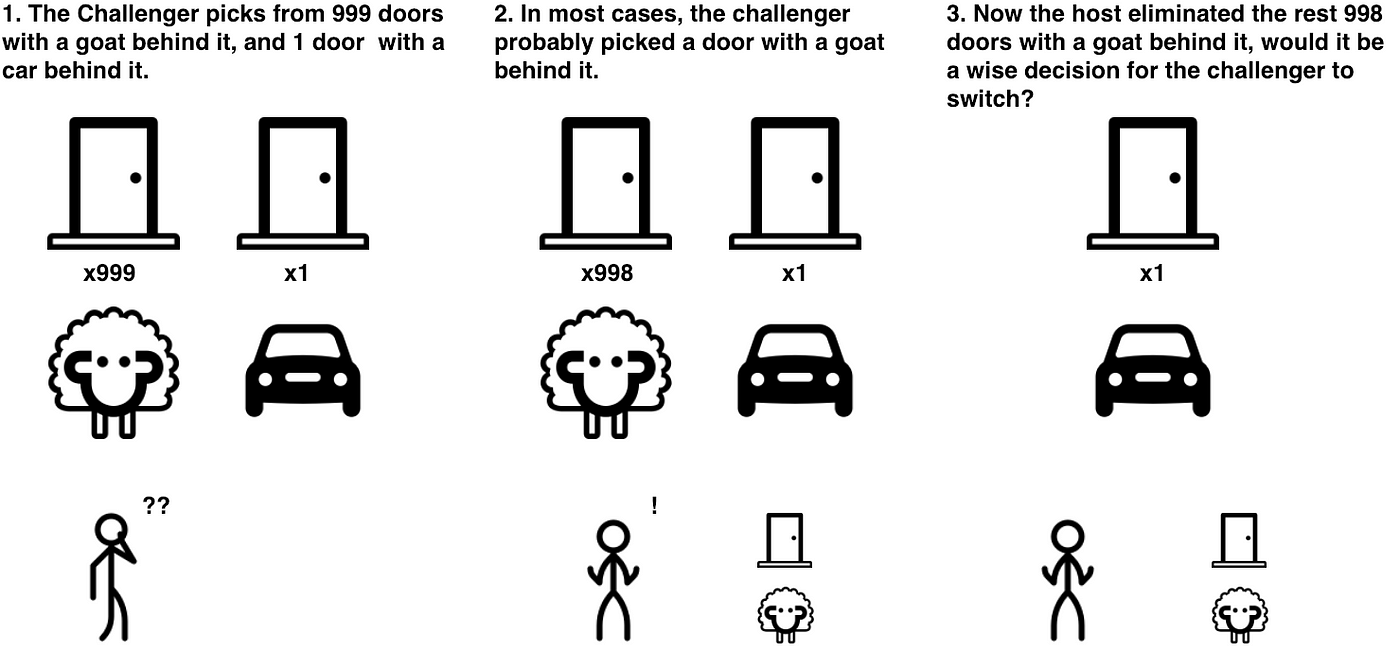


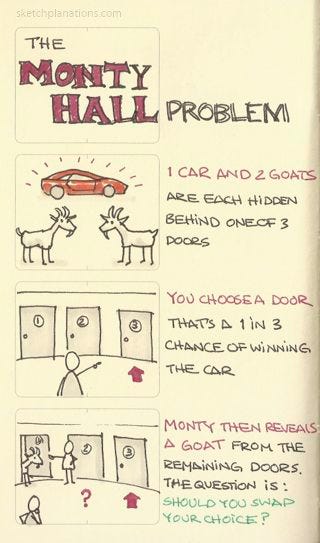

0 Response to "40 monty hall tree diagram"
Post a Comment